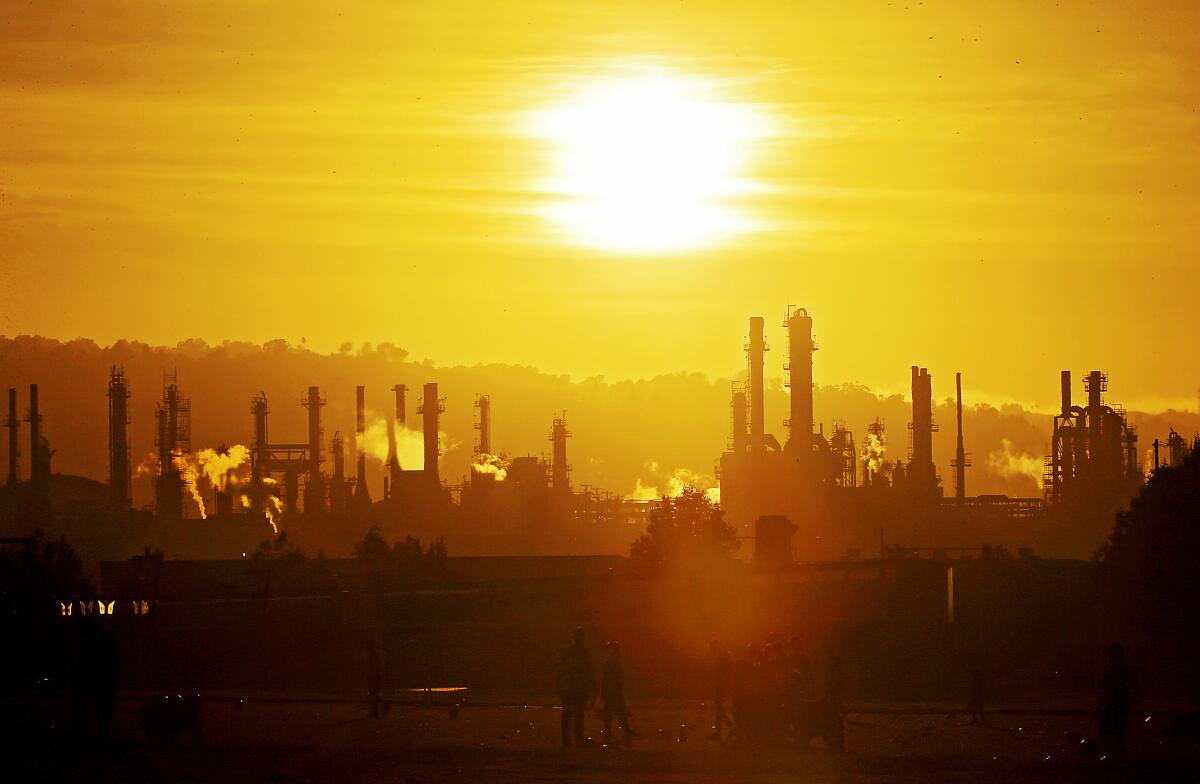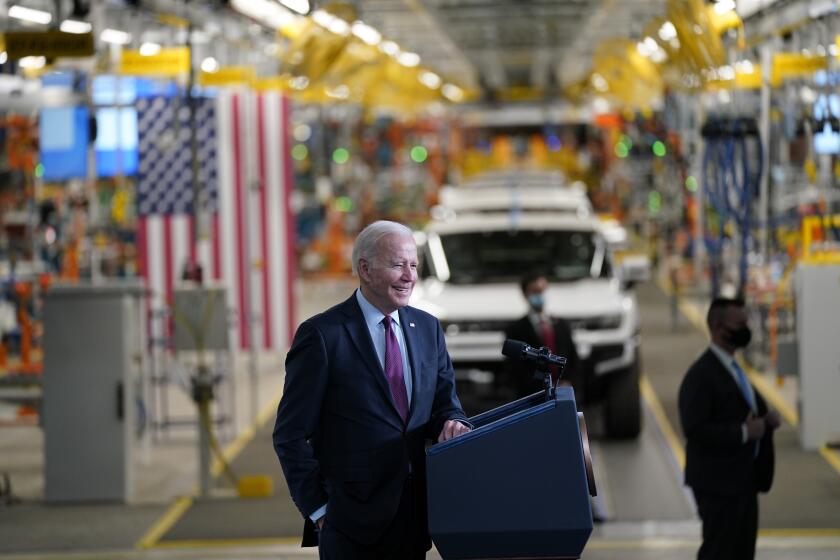Editorial: California can’t let big polluters win by undermining climate change disclosure laws

- Share via
California took a big step last fall when lawmakers passed a pair of laws requiring big companies doing business in the state to disclose their greenhouse gas emissions and climate-related risks, shining a light on their role in fueling the climate crisis.
But now that it’s time for the experts at the California Air Resources Board to craft the disclosure rules, there are some troubling obstacles that could allow polluters to keep their climate impacts hidden for years longer.
The U.S. Chamber of Commerce and other business groups have sued to block the laws, arguing they go too far and violate 1st Amendment free speech rights by forcing companies to release information on the “politically fraught” topic of climate change.
The legal action is no surprise. What is unexpected, however, is the resistance coming from Gov. Gavin Newsom, who signed the bill in October. In his proposed budget for next year, he called for pausing spending temporarily on most newly signed laws, including the funding to implement the disclosure rules. And his office has asked for “cleanup” language that could hand big businesses the kind of watered-down requirements they’ve been lobbying for all along.
President Biden is reportedly looking at delaying electric vehicle rules in an apparent campaign strategy. But backing away from environmental standards is not good for the country, or his reelection.
California was the first state in the nation to pass laws requiring standardized, public reporting of oil companies, banks and other industries that will hold them accountable for their climate pledges, cut through corporate greenwashing and encourage more sustainable practices. Senate Bill 253 requires companies with revenue of more than $1 billion a year to publicly disclose their annual greenhouse gas emissions. SB 261 requires corporations with revenue over $500 million to disclose their climate-related financial risks.
Of course, the oil and gas industry, the banking sector and other business interests don’t want the public and investors to know their full carbon footprints and climate risks.
California’s climate lawsuit against big oil companies isn’t only notable for its pursuit of industry accountability for the damage being caused by fossil fuels. Just as important is its potential to end decades of industry deception about climate change.
It seems industry pressure has influenced Newsom. When he announced that he would sign the disclosure bills on stage at a climate event last fall, he added that it was “with a modest caveat. We have some cleanup on some little language.”
It’s not unusual for new laws to be cleaned up after passage. However, the concerns raised in Newsom’s subsequent signing messages don’t seem minor: He said that the implementation deadlines were likely “infeasible,” the emissions reporting protocol was problematic and he was concerned about the financial impacts on businesses. His office said this week that the administration is working with lawmakers on amendments to address those issues but would not answer questions about what specific changes the governor wants.
State regulators gutted the incentive programs for rooftop solar earlier this year. And now, as feared, the solar industry is contracting. This is the opposite of what we need to fight climate change.
State Sen. Scott Wiener (D-San Francisco), the author of SB 253, said he has no problem with technical fixes to the law but will not support substantive changes or delays. Even though the legislation does not require companies to change their environmental practices, he said the oil industry, chambers of commerce and banks “are squealing like a stuck pig because they do not want the public and investors to know how dirty they are.”
California has a key role at this moment as a bulwark against a nationwide pressure campaign by fossil fuel companies, financial firms and other business interests to resist transparency about their role in causing climate change. That includes the Republican-led movement to restrict the use of environmental, social and governance criteria in investment decisions and various misinformation operations by the fossil fuel industry to confuse the public about the causes of and solutions to climate change. The Golden State should set an unwavering example for other states, including New York and Illinois, that are considering similar laws.
This effort is all the more important now that the U.S. Securities and Exchange Commission has removed ambitious emissions reporting requirements from corporate climate risk disclosure rules it approved Wednesday for publicly traded companies.
Biden can bypass Congress to protect an additional 1 million acres in California, including in the desert near Joshua Tree and the San Gabriel Mountains. He should do so without delay.
California’s legislation goes beyond the SEC proposal by applying to privately held companies and by requiring them to quantify of the full scope of their emissions, from their supply chains to customers’ use of their products.
Weakening these laws would only benefit big polluters, including the powerful oil companies that Newsom has railed against in recent years and vowed to hold accountable. Corporations such as ExxonMobil and Chevron, which have spread climate denial and disinformation for decades and have the most to lose from the public knowing the true extent of their ongoing damage to the planet.
California leaders should recognize that as urgent as it is to pass new laws to fight climate change, it’s just as important to actually enforce them. They should swiftly allocate the funding to begin implementing these laws and reject any significant changes that would weaken them.
More to Read
A cure for the common opinion
Get thought-provoking perspectives with our weekly newsletter.
You may occasionally receive promotional content from the Los Angeles Times.














